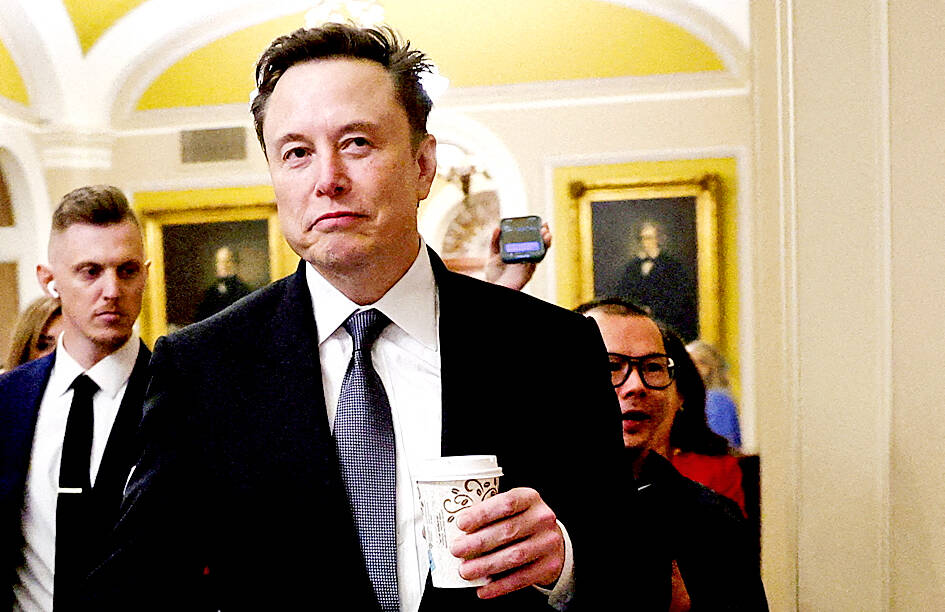Billionaire Elon Musk said that he was not interested in purchasing TikTok, the popular short-video app that the US has been trying to ban over national security concerns with its Chinese owner ByteDance Ltd (字節跳動).
Musk’s comments, made late last month, were released online on Saturday by The WELT Group, a part of the German media company Axel Springer SE, which hosted a summit which the Tesla Inc chief joined via video.
“I have not put in a bid for TikTok,” Musk said a week after US President Donald Trump said he was open to Musk buying the ByteDance-owned app if he wanted to do so.

Photo: Reuters
“I don’t have any plans for what I would do if I had TikTok,” Musk said, adding that he does not use the short video app personally and was not familiar with the app’s format.
“I’m not chomping at the bit to acquire TikTok, I do not acquire companies in general, it’s quite rare,” Musk said, adding that his billion-dollar acquisition of social media platform Twitter, now called X, was unusual.
“I usually build companies from scratch,” Musk said.
Trump signed an executive order seeking to delay the enforcement of a ban on the popular short-video app that was slated to be shuttered on Jan. 19.
ByteDance was given the January deadline to sell the US assets of TikTok or face a US ban, following US lawmakers’ concerns that the app poses national security risks, because China could compel the company to share the data of its US users.
TikTok has denied that it has or ever would share US user data.
Apple Inc and Google have not reinstated TikTok to their app stores since a US law took effect.
TikTok on Friday said that it was allowing US Android users to download and connect to the app through package kits on its Web site to circumvent restrictions on the popular platform in the country.
Trump has said that he was in talks with multiple people over TikTok’s purchase and would likely have a decision on the app’s future this month. It has about 170 million US users.
Last week, the US president signed an executive order to create a sovereign wealth fund within the year, saying it could potentially buy TikTok.
ByteDance has previously denied any plans to sell TikTok.

SETBACK: Apple’s India iPhone push has been disrupted after Foxconn recalled hundreds of Chinese engineers, amid Beijing’s attempts to curb tech transfers Apple Inc assembly partner Hon Hai Precision Industry Co (鴻海精密), also known internationally as Foxconn Technology Group (富士康科技集團), has recalled about 300 Chinese engineers from a factory in India, the latest setback for the iPhone maker’s push to rapidly expand in the country. The extraction of Chinese workers from the factory of Yuzhan Technology (India) Private Ltd, a Hon Hai component unit, in southern Tamil Nadu state, is the second such move in a few months. The company has started flying in Taiwanese engineers to replace staff leaving, people familiar with the matter said, asking not to be named, as the

The prices of gasoline and diesel at domestic fuel stations are to rise NT$0.1 and NT$0.4 per liter this week respectively, after international crude oil prices rose last week, CPC Corp, Taiwan (台灣中油) and Formosa Petrochemical Corp (台塑石化) announced yesterday. Effective today, gasoline prices at CPC and Formosa stations are to rise to NT$27.3, NT$28.8 and NT$30.8 per liter for 92, 95 and 98-octane unleaded gasoline respectively, the companies said in separate statements. The price of premium diesel is to rise to NT$26.2 per liter at CPC stations and NT$26 at Formosa pumps, they said. The announcements came after international crude oil prices

DOLLAR SIGNS: The central bank rejected claims that the NT dollar had appreciated 10 percentage points more than the yen or the won against the greenback The New Taiwan dollar yesterday fell for a sixth day to its weakest level in three months, driven by equity-related outflows and reactions to an economics official’s exchange rate remarks. The NT dollar slid NT$0.197, or 0.65 percent, to close at NT$30.505 per US dollar, central bank data showed. The local currency has depreciated 1.97 percent so far this month, ranking as the weakest performer among Asian currencies. Dealers attributed the retreat to foreign investors wiring capital gains and dividends abroad after taking profit in local shares. They also pointed to reports that Washington might consider taking equity stakes in chipmakers, including Taiwan Semiconductor

A German company is putting used electric vehicle batteries to new use by stacking them into fridge-size units that homes and businesses can use to store their excess solar and wind energy. This week, the company Voltfang — which means “catching volts” — opened its first industrial site in Aachen, Germany, near the Belgian and Dutch borders. With about 100 staff, Voltfang says it is the biggest facility of its kind in Europe in the budding sector of refurbishing lithium-ion batteries. Its CEO David Oudsandji hopes it would help Europe’s biggest economy ween itself off fossil fuels and increasingly rely on climate-friendly renewables. While